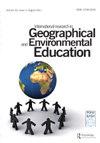The challenge of measuring children’s attitudes toward wildlife in rural India
IF 3.1
Q2 EDUCATION & EDUCATIONAL RESEARCH
International Research in Geographical and Environmental Education
Pub Date : 2021-03-15
DOI:10.1080/10382046.2021.1897339
引用次数: 3
Abstract
Abstract People’s attitudes influence the nature of their interactions with wildlife and support for conservation. Globally, many environmental education programs seek to influence children’s attitudes toward wildlife and the environment. Understanding these attitudes requires assessment tools that are appropriate to the context and culture. However, most tools have been developed and used in Western developed countries, making their effectiveness elsewhere questionable. The Wild Shaale environmental education program was launched in 2018 in rural India with the goal of enhancing children’s positive attitudes toward wildlife. To design an evaluation for Wild Shaale, we tested five tools to assess children’s attitudes toward wildlife with 1772 students in 56 rural schools. Here, we discuss the challenges encountered while testing these tools and report which tools are likely to be valid measures of variation in children’s attitudes and which may be useful for program evaluation. We provide recommendations for assessing children’s attitudes in similar contexts.衡量印度农村儿童对野生动物态度的挑战
人们的态度影响着他们与野生动物互动的性质和对保护的支持。在全球范围内,许多环境教育项目试图影响儿童对野生动物和环境的态度。理解这些态度需要适合环境和文化的评估工具。然而,大多数工具都是在西方发达国家开发和使用的,因此它们在其他地方的有效性值得怀疑。野生草原环境教育项目于2018年在印度农村启动,旨在提高儿童对野生动物的积极态度。为了设计对野生动物的评估,我们在56所农村学校的1772名学生中测试了五种工具来评估儿童对野生动物的态度。在这里,我们讨论了在测试这些工具时遇到的挑战,并报告了哪些工具可能是儿童态度变化的有效衡量标准,哪些工具可能对项目评估有用。我们提供了在类似情况下评估儿童态度的建议。
本文章由计算机程序翻译,如有差异,请以英文原文为准。
求助全文
约1分钟内获得全文
求助全文
来源期刊

International Research in Geographical and Environmental Education
EDUCATION & EDUCATIONAL RESEARCH-
CiteScore
5.20
自引率
33.30%
发文量
11
期刊介绍:
International Research in Geographical & Environmental Education publishes quality research studies within the context of geographical and environmental education. The journal endeavours to promote international interest and dissemination of research in the field, provides a forum for critique, and demonstrates the relevance of research studies to good professional practice.
 求助内容:
求助内容: 应助结果提醒方式:
应助结果提醒方式:


